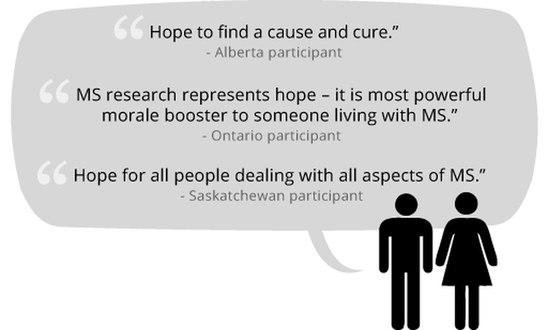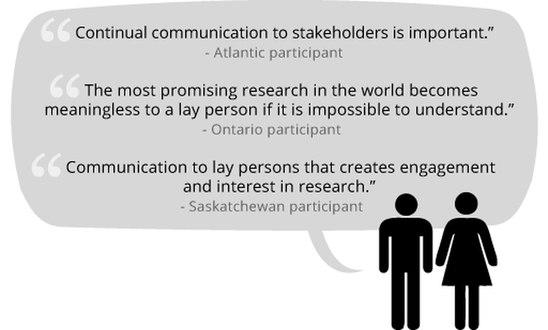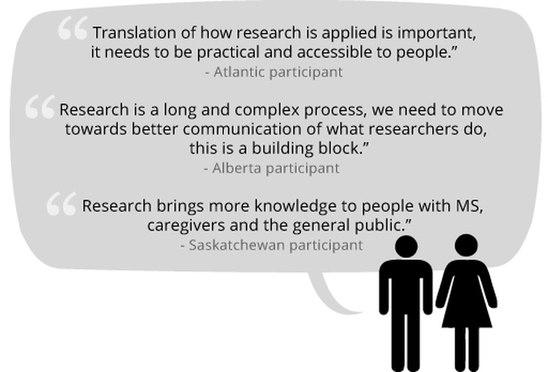
Research Priorities Discussion
The history of the Multiple Sclerosis Society of Canada is deeply rooted in a number of individuals from different backgrounds and places who realized the need to learn more about the disease. It was the actions of Sylvia Lawry whose brother had been diagnosed with MS that set everything in motion with a simple advertisement in the New York Times. Her advertisement also attracted the attention of Dr. Colin Russel, a neurologist and Evelyn Opal and Harry Bell, both whom lived with MS. All three had different backgrounds but it was through their desire to know more about MS, that the MS Society of Canada was created.
To this day, the varying stakeholders who make up the MS Society — the person living with MS, the caregiver of their loved one with MS, the cyclist riding sixty kilometers for research, or the researcher trying to study the complexities of the disease — are all aiming for one thing: to further understand MS so that one day we can end MS.
Since 1948 the MS Society of Canada has contributed $140 million towards MS research. This investment of funding has enabled Canada to create a pipeline of exceptional MS researchers and has become a leading contributor to discovery in the field of MS.
However, significant questions remain unanswered with regard to the cause, prevention and cure of MS.
To aid the MS Society in mapping out research priorities for the next 10 years, a series of discussions took place across the country with the intent of understanding varying experiences and perspectives. Seven full-day live and interactive discussions were held, bringing together both the research community and people affected by MS. Two key questions were asked: What does MS research mean to you? What are your research priorities?
What does MS research mean to you
In roundtable discussions around the country, people living with MS, people affected by MS, donors, young researchers/clinicians and MS Society staff discussed what MS research meant to them. The sessions allowed for open discussion of everyone’s perspective, from the person living with MS stating that research gives us the ability to unlock doors to new treatments for MS and other diseases; to researchers stating that MS research means trying to live up to the expectation and hopes of the MS community. Although participants came from diverse backgrounds, it was clear that communication about research is crucial as is the need to increase knowledge. The end result is increased hope, the common denominator that keeps research activities moving forward.
Hope
The most significant theme emerging from the discussions about what research meant to those participating in the dialogue was hope. Hope in MS research meant different things to different people, but at the foundation of this notion was simply that research provided both optimism and expectation of what the future could bring in relation to finding the cause and cure of MS.

For some, hope equated to research resulting in a cure. For others, research to provide for a healthier, more manageable future in living with MS was also important. The notion that research could also improve one’s quality of life was as important as research for a cure.
Communication
Another important aspect of the discussion in answering the question of what research meant to participants was the importance of communication. There are several facets to this theme. One facet was acknowledgement from both those who conducted the research, and from those who lived with MS, that greater engagement with each other was required. A researcher understanding what it meant to live with MS on a daily basis would benefit as much as a person living with MS understanding research outcomes in layperson terms. The two-way dialogue, between people living with MS and the researcher, could be a powerful tool in understanding disease-related issues and translating them into critical, underlying information in a research setting. In the same fashion, a person living with MS, hearing directly from a researcher about their work, provides a powerful tool of hope, of better understanding of what the future could promise through research.

Knowledge
A third critical theme that emerged from the discussion related to what research meant to participants was knowledge. Not only are there many unanswered questions related to MS research, the recent worldwide interest in CCSVI also emphatically highlighted the need for clear translation of research into understandable, meaningful terms. At the end of the day, the knowledge gained from research should be distilled to answer the key question a person living with MS might pose: “What does it mean for me?” Translating research into understandable and meaningful language can empower the person living with MS to make informed decisions about their own treatment and care.

A second important aspect related to the discussion of knowledge is the actual translation of research into outcomes that can be applied in day-to-day living. The term “bench to bedside” is most commonly used in this context, but the notion is inherent to the hope a person living with MS might have in research. This is again is where dialogue between researchers and people living with MS is critical. What does “bedside” mean for the person with MS? In other words, in the vast amount of research that needs to be translated from bench to bedside, what are the priorities? Knowledge sharing can also uncover gaps or information that may have been overlooked leading to further discovery and analysis.
MS progression timeline
The participants were asked to provide insights on the MS progression timeline (see below), that outlines specific milestones in one’s journey with MS. It should be noted that the MS progression timeline was designed to spur discussion and does not necessarily reflect how an individual’s MS progresses. For MS researchers, we requested that they highlight areas where we have made advances and areas that required more work. Through this activity, each stakeholder was able to better appreciate the other’s perspective and most importantly, we were able to develop the research priorities from these discussions. The following common answers and themes were generated from this exercise. (Full responses can be found in the Research Priorities Discussion document)

Some groups wondered about the order of events across the timeline, noting that given the complexity of the disease and the variance of disease courses amongst individuals, the events in the timeline do not always occur in that order and often overlap.
Many of the groups drew arrows across the timeline to signify events which take place over a much longer time course. Statements such as “information gathering”, “general decline”, “denial of diagnosis”, “symptom management”, and “awareness and advocacy” were marked on the timelines as events which occur throughout a lifetime for someone with MS.
Identifying research priorities
It was through the discussions of the MS progression timeline that participants in every Division identified and created a list of areas that they felt were areas of MS research that needed further work. Many of the lists contained over 20 topics that participants felt warranted further research. Each participant was given an opportunity to prioritize the list, resulting in a top 5 research priority list from each Division.
Using a point system, a consolidated list of the top 5 research priorities was created as follows:
- Cause
- Repair/Remyelination
- Life Modifying Therapies (Exercise, Diet , Quality of Life)
- Progressive MS (tie)
- Diagnosis (Tie)
- Cognition and Mental Health
The next step is for the MS Society to develop strategies that consider the expressions of these stakeholders.
It is interesting to note that when we embarked on this process, we truly believed that the priorities between the various stakeholders would be very different. However, as the discussion has revealed, priorities are very much aligned across perspectives – even with the different stakeholder groups taking part in the discussions.
As we move forward with further refining our research priorities moving into the future, the MS Society will continue to consult our core stakeholders: those living with or affected by MS, donors, staff and the researcher/clinician communities.
We thank all participants for their involvement in these important discussions and welcome continued feedback. These discussions have helped foster discussion, collaboration and partnership – important elements as we continue in our efforts to end MS.
Hope. Knowledge. Research. Now.
A critical aspect in engaging people living with MS directly in our research process has uncovered a priority that should be explored further. We learned through our discussions during these nationwide research priorities sessions that research knowledge made an impactful contribution to the hope of people living with MS. However, not only did they express research into a cause, cure and treatments as critical to sustaining their day-to-day hope, it was also important to acknowledge that this work needed to be done now. It is known that research and the processes related to research take time, resulting in the accepted notion that people would be patient while research ran its course. It has become increasingly evident, though, that this notion should not be accepted nor is it sufficient. The need to speed up that process of research to find a cure here and now needed to occur. Decisions related to directed research, involving people with MS as laypersons in granting processes, and understanding the need for exploring ways to invest in the traditionally underinvested area of translational research – these are some of the things that can be improved to challenge the view that research takes time. Accelerating the pace of research is just as critical to the hope of people living with MS as the research itself.